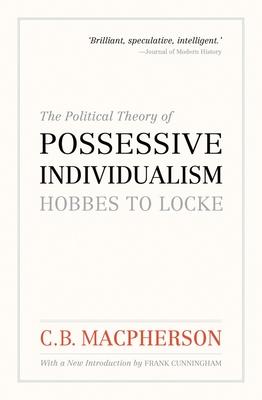This seminal work by political philosopher C.B. Macpherson was first published by the Clarendon Press in 1962, and remains of key importance to the study of liberal-democratic theory half-a-century later. In it, Macpherson argues that the chief difficulty of the notion of individualism that underpins classical liberalism lies in what he calls its "possessive quality"--"its conception of the individual as essentially the proprietor of his own person or capacities, owing nothing to society for them." Under such a conception, the essence of humanity becomes freedom from dependence on the wills of others; society is little more than a system of economic relations; and political society becomes a means of safeguarding private property and the system of economic relations rooted in property.
As the New Statesman declared: "It is rare for a book to change the intellectual landscape. It is even more unusual for this to happen when the subject is one that has been thoroughly investigated by generations of historians. . . Until the appearance of Professor Macpherson's book, it seemed unlikely that anything radically new could be said about so well-worn a topic. The unexpected has happened, and the shock waves are still being absorbed."
A new introduction by Frank Cunningham puts the work in a twenty-first-century context.
| FindBook |
有 1 項符合
The Political Theory of Possessive Individualism: Hobbes to Locke的圖書 |
 |
The Political Theory of Possessive Individualism: Hobbes to Locke 作者:MacPherson,C. B./Cunningham,Frank(INT) 出版社:Oxford Univ Pr 出版日期:2011-03-18 語言:英文 規格:平裝 / 310頁 / 13.3 x 20.3 x 1.3 cm / 普通級/ 初版 |
| 圖書館借閱 |
| 國家圖書館 | 全國圖書書目資訊網 | 國立公共資訊圖書館 | 電子書服務平台 | MetaCat 跨館整合查詢 |
| 臺北市立圖書館 | 新北市立圖書館 | 基隆市公共圖書館 | 桃園市立圖書館 | 新竹縣公共圖書館 |
| 苗栗縣立圖書館 | 臺中市立圖書館 | 彰化縣公共圖書館 | 南投縣文化局 | 雲林縣公共圖書館 |
| 嘉義縣圖書館 | 臺南市立圖書館 | 高雄市立圖書館 | 屏東縣公共圖書館 | 宜蘭縣公共圖書館 |
| 花蓮縣文化局 | 臺東縣文化處 |
|
|
圖書介紹 - 資料來源:博客來 評分:
圖書名稱:The Political Theory of Possessive Individualism: Hobbes to Locke
|











